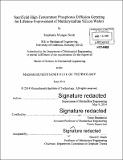Sacrificial high-temperature phosphorus diffusion gettering for lifetime improvement of multicrystalline silicon wafers
Author(s)
Scott, Stephanie Morgan
DownloadFull printable version (8.412Mb)
Other Contributors
Massachusetts Institute of Technology. Department of Mechanical Engineering.
Advisor
Tonio Buonassisi.
Terms of use
Metadata
Show full item recordAbstract
Iron is among the most deleterious lifetime-limiting impurities in crystalline silicon solar cells. In as-grown material, iron is present in precipitates and in point defects. To achieve conversion efficiencies in excess of 20%, bulk minority-carrier lifetimes in excess of 300 Rs (p-type) are required [1]. For cost-effective multicrystalline silicon wafers, achieving this lifetime often requires gettering. Gettering at higher temperatures for longer times is often necessary to fully dissolve and remove precipitated impurities. However, such time temperature profiles can result in unacceptably deep emitters, affecting the blue response of the finished device. Here, we explore a "sacrificial" gettering step, in which gettering and emitter-formation steps are decoupled and optimized independently. The optimization of the sacrificial gettering step is guided by the Impurity-to-Efficiency simulation tool [2] and explores higher temperatures (up to 1100°C) than standard industrial processes (typically 820-850°C). The models indicate that iron concentration should be reduced by higher-temperature gettering, which is confirmed by experiment. However, uniform lifetime degradation occurs at higher temperatures, suggesting another homogeneously distributed defect is generated as a result of the high-temperature gettering process. A list of candidate defects is presented.
Description
Thesis: S.M., Massachusetts Institute of Technology, Department of Mechanical Engineering, 2014. Cataloged from PDF version of thesis. Includes bibliographical references (pages 71-75).
Date issued
2014Department
Massachusetts Institute of Technology. Department of Mechanical EngineeringPublisher
Massachusetts Institute of Technology
Keywords
Mechanical Engineering.